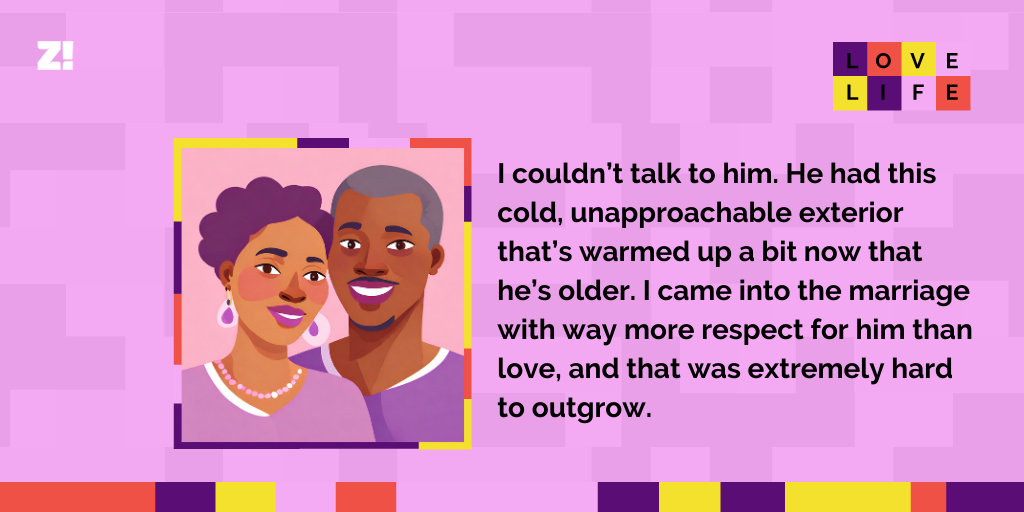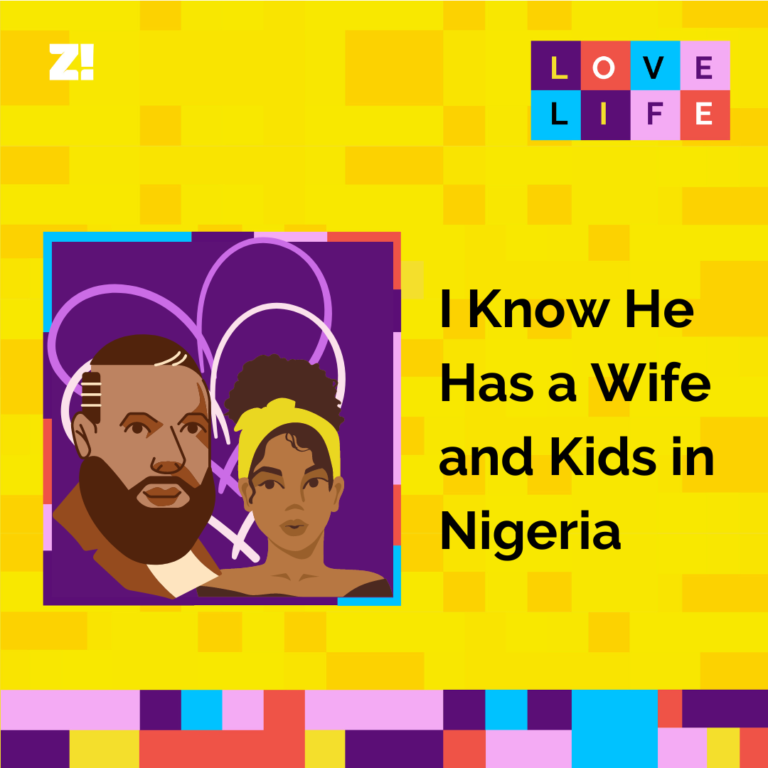Love Life is a Zikoko weekly series about love, relationships, situationships, entanglements and everything in between.

What’s your earliest memory of each other?
Nnanna: She was bosom friends with my youngest sisters. I remember them playing together a lot. Sometimes, after the holidays, my mum would put them in the same car, with all their boxes, to go to boarding school in the South-West. We grew up together because our fathers were friends and business partners, almost kin. We’re from neighbouring villages in Abi, Enugu State.
Stella: I remember him as a much older brother I couldn’t dare talk to. My own older brother was much younger than him.
I only ever saw him when I went to their house to visit his sisters. But they came to mine more often, so I only saw him a couple of times before I went off to university in 1984.
Did you become friends afterward?
Nnanna: No. I never really thought about her until my father started pressuring me to find a responsible girl to build my home for me. As soon as I turned 30, he decided it was time for me to settle and told me he knew the perfect woman to make me happy. He didn’t force the decision on me but asked me to trust that he could make the right choice for me based on his wide experience.
Stella: After graduating in 1988, I returned home and my own father called to speak with me. He told me one of his friend’s sons had asked to marry me. I laughed because me and my dad had such a cordial relationship. I didn’t think he was serious.
Later, my mother came to talk to me too. She convinced me that having someone older, more responsible and financially free, who was already ready to commit, was a lucky thing. I’d be safe from wasting away my youth testing the waters with boys who hadn’t even figured out their lives yet.
How did you feel about that, Stella?
Stella: I was stubborn for a short while because I didn’t like that the decision was made for me. But once I met him again after close to five years, and we talked, I saw my mother’s point. I was infatuated almost immediately.
How did things proceed from there?
Nnanna: From the very beginning, it was clear our fathers’ goal was to consolidate their businesses. My father had made similar “love matches” between my brothers and children of other business or political figures in his network. I didn’t mind it, but we also didn’t marry immediately because my heart wasn’t in it for the longest time.
We courted for another three years before I told my father I was ready and we started the traditional proceedings.
Stella: I was happy to wait. I wanted to start my career without distraction from marriage or children. I was still in my early 20s and wanted to enjoy my singleness for a bit. I never really thought about love during this period because he always sent gifts and made other kind gestures. His constant effort made me believe I was always on his mind.
I had fairytale wishes of passionate love thanks to our romance books those days, but my mum always made it clear to me and my sisters that those were unrealistic. She’d give us lectures about the “real world”, and those helped me endure a lot later on.
If you want to share your own Love Life story, fill out this form.
What was it like during the traditional rites?
Stella: I remember being tired throughout. When we started with the introduction and house calls, I was excited. But he told me I was childish to be so excited. That deflated my initial energy. He grumbled about how unnecessary the whole thing was since we all knew each other.
Nnanna: What was the point of the introductions when our families were already so close? I knew all the ceremony we would have to engage in, so I just wanted to be done with it all.
Stella: Our families were all overjoyed. It was a perfect, long-awaited union in their books. But for me, it was the moment when I realised I didn’t know this man I was marrying at all. We’d barely said two sentences to each other in four years.
I suddenly had a bad feeling about everything. I had no idea how I’d gotten there.
I shared my misgivings with one of my sisters, and she convinced me it was just nerves. I didn’t have the nerve to tell my parents anything.
Did you try to talk to him, and how did you both get through this stage?
Stella: There was no opportunity to. The wedding period was this big dramatic affair that didn’t really leave much room for clear thought and conversation. Everyone was organising one thing or the other. My friends were with me. One of them said I should speak out if I wasn’t happy with everything. I don’t know if I’d have even known how to approach him to say, “I’m not doing again.” Why? I didn’t even know why.
Nnanna: In the midst of it all, I was constantly working. I helped my father with the family business — some miscellaneous retail stores around Enugu and Anambra — so I was figuring out logistics and meeting business partners. My head wasn’t even in the wedding at all. So I don’t know how I’d have reacted if she even came to tell me any of that. It was a much different time then than it is now.
Stella: After almost a month of all the customary rites, we had our traditional wedding and a church wedding a week later. I think the week between the traditional and church was when we got to talk and get to know each other. I know that sounds amazing after we had almost four years to court, right?
It does
Stella: That’s because I wouldn’t even call that period “courtship”. We didn’t go on dates or communicate beyond the regular gifts, odd phone call or greetings through my father. I can’t explain it myself what we spent those four years doing. We somehow survived together on the strength of a promise our fathers made us make.
What was life like after the wedding?
Stella: Things moved rather quickly until I found myself with my first two sons and unhappy. He was married to work and business while I was extremely lonely.
Nnanna: As soon as we got married, I convinced her to stop working, and I think that was the worst mistake I could’ve ever made. That singular act turned both of us into the worst versions of ourselves.
Why do you think you asked her to?
Nnanna: I thought it was my way of spoiling her. I didn’t want her to have to stress over anything.
Stella: But then, he looked down on me the longer I relied on him for everything. When he was stressed about cash flow, he’d take it out on me, throwing insults and being aggressive.
I had to ask for every little thing, and I didn’t like that. But when I realised I should get back to work, I was almost five years out of the job market with two kids and no idea how to get back in.
The worst part was he was rarely home, so I had nothing to do with all the free time. Over time, I learnt to find communities in church and my old friends, have personal projects like writing or volunteering and participate in my children’s school activities. But those first five to ten years were difficult.
Nnanna: I’ll admit I didn’t realise how hard it was for her until much later. I thought she was lucky to not have to struggle to get out of the house early and work late just to make enough money to afford our lifestyle.
Did you talk to him about these things?
Stella: I couldn’t talk to him. He had this cold, unapproachable exterior that’s warmed up a bit now that he’s older. I came into the marriage with way more respect for him than love, and that was extremely hard to outgrow.
There were times when we slept in separate rooms for up to a year because he wanted his space.
Nnanna: I was under a lot of pressure business-wise, and I didn’t want the stress to affect her.
Stella: I thought he hated me. And when I went crying to my mother or elder sister, they’d tell me to grow a thicker skin. “This is adulthood. You’re an adult now.” Then I‘d feel ashamed for going to them.
Did you figure things out on your own?
Stella: More or less. It took time.
This was our reality for years, and we learnt to live with it. It took us growing older and asking ourselves, “Do we have anything between us to keep this marriage together?” This was in 2012, on our 20th wedding anniversary. The kids were all in boarding school, with our eldest in university, and we found that we had nothing to celebrate.
Nnanna: I didn’t remember it was our 20th until my assistant mentioned it while making arrangements for gifts to send to Stella. She said, “Don’t you think you should take her out instead since this is the 20th?” I agreed and told her to make the arrangements. But some hours later, Stella called me upset.
Stella: First, why couldn’t he call me himself? Why send his assistant? I told him we had nothing to celebrate. I’m glad I acted on impulse because, for the first time in 20 years of marriage, we had a proper conversation about our relationship.
How did that go?
Nnanna: That night, we sat down in our room and talked. It wasn’t a long talk, but we committed to doing more things together. We talked about a small jewellery business she’d started on her own, and right away, I put money into it. We also started attending my club meetings together.
Things didn’t change overnight, but with these small things we started doing, I’ve seen how it has improved the situation of things in our marriage.
In what ways?
Stella: We’d grown apart over the first two decades. We led separate lives and only came together to perform our marital duties and talk about our children’s welfare. We ended up having six boys so that elongated the period of emotional separation. Imagine that he didn’t know I had a one-year-old jewellery business, and we lived under the same roof.
We now talk to each other more often.
Nnanna: I think it also improved my tendency to “protect” her from things by keeping them away from her. I’m actually relieved when I can share my burdens with her now. Old age helps because as a young man, I had more ego. I didn’t want her to see me as weak or incapable of taking care of her or providing in any way. I wasn’t willing to realise that the pressure also made me treat her badly.
Stella: That’s true. There’s way less pressure on him now that he’s more or less retired.
Nnanna: And just like she said earlier, having six children put a strain on us physically, mentally and financially. We had to focus on raising them at the expense of our marriage like most good parents end up doing. I don’t regret making that sacrifice. But I regret having so many children that made us make that sacrifice for longer than we had to.
This is not to say I don’t love each of my six young men equally.
Of course. How would you rate your Love Life on a scale of 1 to 10?
Stella: 7. We’re still building the love part, but we’ve come a long way after our shaky foundation.
Nnanna: Well said. I’m in agreement.
Check back every Thursday by 9 AM for new Love Life stories here. The stories will also be a part of the Ships newsletter, so sign up here.
RELATED: Love Life: Finances Were Tight But Love Makes You Creative




